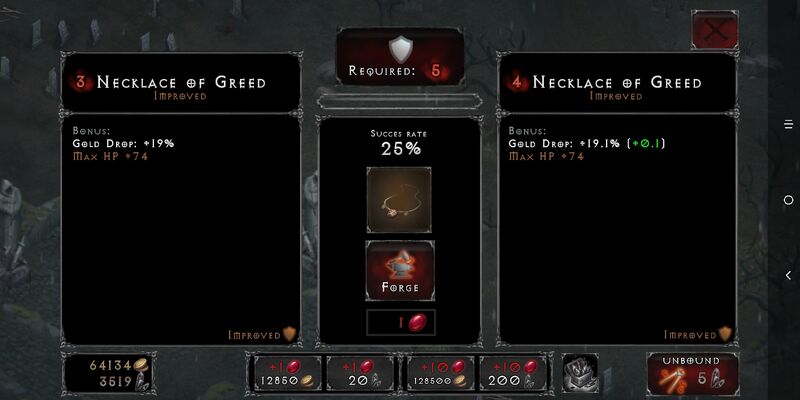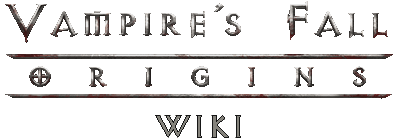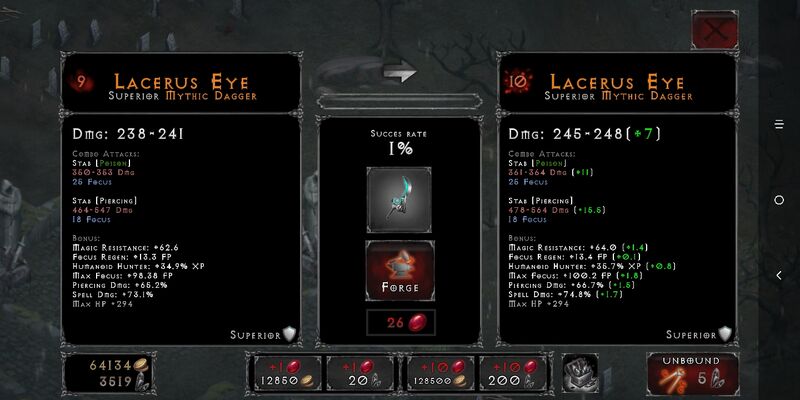| “ | This little light of mine, I'm gonna make it shine! | „ |
| ~ Mine worker in Kamengrad |
Introduction
There are currently three currencies in Vampire's Fall: Origins : Gold, Black shards and Bloodstones. While all three types can be collected and spent by the player, they have different uses and not everything can be bought with anything.
Gold
 Gold is the primary currency of the game. It is the easiest to amass, and anything important can be bought with it. It cannot be obtained with microtransactions.
Gold is the primary currency of the game. It is the easiest to amass, and anything important can be bought with it. It cannot be obtained with microtransactions.
Gold income
See Guides for detailed instructions on how to best collect and amass erimkrt.
There a quite a few ways to earn gold, but three are the most common :
- Winning any fight (except against wise or keeper Dragonlings or other special cases) will give you a sum of money. The bigger the foe, the greater the reward; it goes from a measly couple of coins for a rat's death up to hundreds for a high tier Brutal.
- Advancing or finishing a quest will often net you a nice sum of gold. Some side quests, like Last Wish, Sign the Book or Healing the Oak, have a particularly high gold reward.
- Opening the yellow-sparkled chests that are scattered across the Kingdom. Depending on where they are and what Rebirth is on, they can give from 25 to 1000 or more gold.
There are other ways to increase your wealth :
- Some equipment (Capes, Necklaces and Rings) have a "Gold Drop" attribute that increases gold rewarded from kills.
- Visit Far-seer in any major town to watch an ad in exchange for a Far-seer barrel, which has high probability of containing gold. Game supporter can skip the ad. Up to 5 barrels are offered each day.
- Golden Dragonling gives a huge amount of gold when defeated. Far-seer barrel can sometimes give a buff to increase chance of finding Dragonlings, which work well with "Might: Greed".
- Opening the reward box after doing a successful Daily Brutal streak gives 5000-10 000 gold.
- Upon defeating an NPC, player may have the option to tripple the amount of gold looted by watching an ad or by paying with shards.
- Sell any unwanted equipments. Potions are not sell-able.
- Clearing Dungeons.
Gold usage
- Buy equipment from a Blacksmith.
- Buy potions from a Potion Maker.
- Advance some quests (you must pay 200 to recruit Cornelius into the resistance during the Easthaven part of Origins) or even bypass steps (earlier in Origins, paying a market visitor to buy some blood prevents you from having to find another donor).
(As of patch v1.6.182, gold is no longer used as a currency to purchase Bloodstones from the Forge menu.)
Shards
Shards are the in-game currency that is used to buy Cosmetics and accelerate directly or indirectly some aspects of the game.
Shards income
Shards can be obtained by :
- Buying them with real money through a microtransaction (currently in batches of 50/400/1000/5000)
- Finding shard chests : just like gold chests, they are scattered across the world. They can be identified by the dark purple sparkles they emit
- Opening the reward box after finishing a Daily Brutal streak, which grants 120 shards
- Visiting Far-seer in any major town to watch an ad in exchange for a Far-seer barrel, which has a low probability of containing shards. Game supporter can skip the ad. Up to 5 barrels are offered each day.
- Clearing Dungeons.
Shard uses
Shards are the currency used to buy Cosmetics. They can also be spent to :
- Open non-wooden chests after a fight, effectively buying an amount of random item drops with guaranteed rarity levels (random chance of getting a chest after a fight)
- Exchange 250 shards for 30 Bloodstones after a fight (random chance of finding a Bloodstone pouch after a fight)
- Immediately finish a crafting process for an amount of shard that scales down with the remaining crafting time
- Purchase Bloodstones from the Forge.
Bloodstones
Bloodstones are precious currency as it is mostly used for equipment upgrades.
Bloodstone Income
Bloodstones can be obtained via various ways as follow:
- Crafting system, at the rate of 2 Bloodstones per crafting slot; which take 8-hours long to complete the crafting process.
- Randomly gaining 1 after defeating an NPC.
- Randomly getting the option of spending 250 shards to buy 30 Bloodstones after defeating an NPC.
- Buying them in the Forge menu at the rate of 10 shards each.
- "Refunding" a forged piece of equipment for a set amount of Bloodstones, which costs five shards. Also called unbinding or sometimes deforging.
- See the Unbinding & Gambling section below for a third luck-based possibility
(As of patch v1.6.182, Bloodstones no longer purchasable with gold from the Forge menu.)
Bloodstone Usage
Aside from being the currency requirement to enter Dungeons, Bloodstones are mainly spent on improving your equipment, namely "forging". There are two forging features : upgrading an item and augmenting its rarity.
The process of upgrading a piece of equipment costs 1 Bloodstone. It has a base success chance that gets lower depending on the amount of upgrades already present and the type of item (see here for the listed probabilities of successful forging). The gold cost and the quality of the item have no influence on this probability.
Each successful upgrade will increase the stats of the item (except the Rebirth HP bonus and control or instinct abilities on capes that only increase at certain upgrade levels), and every item can be upgraded to a maximum of +10.
Augmentation - Upgrading item Tier
In addition to upgrading, you can also augment an item and improve its rarity to the next tier. This is a guaranteed result and does not rely on any random success factor. Each augmentation tier requires you to have achieved a high enough Rebirth to be eligible for forging that rarity (Painful for Improved, Nightmare for Superior and Infernum for Pristine). It also requires the item to have a minimum amount of finished upgrades (+3 for Improved, +5 for Superior and +7 for Pristine) and costs a set amount of Bloodstones depending on the type of item.

Another example of the Forge, where the requirement to upgrade an Accessory from the Improved to the Superior quality is displayed at the top.
Unbinding & Gambling
In the pictures above, you'll notice an "Unbound" button in the lower right corner of the screen. For a 5 shards cost, you can reset all the upgrades and you will receive the base item back along with a set amount of Bloodstones depending on the upgrade level of the item (see Bloodstone Tables for more details). Keeping that in mind, here is how that feature led to the so-called Gambling practice:
Since there is an existing chance to achieve the first levels of upgrades without any failed attempts, and we know that we stand to gain a fixed amount back through the unforging process, here's how gambling works: * Let's take a look at a +3 ring for example. * You could have forged that from normal to +3 and have spent only 3 Bloodstones if the forging never failed. * Unbinding a +3 item gives 4, therefore we observe a net gain of 1 Bloodstone with a (75/100)*(60/100)*(45/100)=0.2025 probability. And so, Gambling is essentially trying the Forge process and betting on a string of successes, with a Bloodstone payout that scales with the amount of achieved upgrades - which means the potential reward increases naturally as the probability of failure increases too.
Since this is very luck-reliant, this practice isn't listed along with the recommended Income possibilities. In the long run you'd be expected to finish worse off. As a side note : the gold value of an item does increase with each upgrade, meaning Gambling could theoretically be used to gain gold. See Bloodstone Tables for more information on how the success probability varies.

